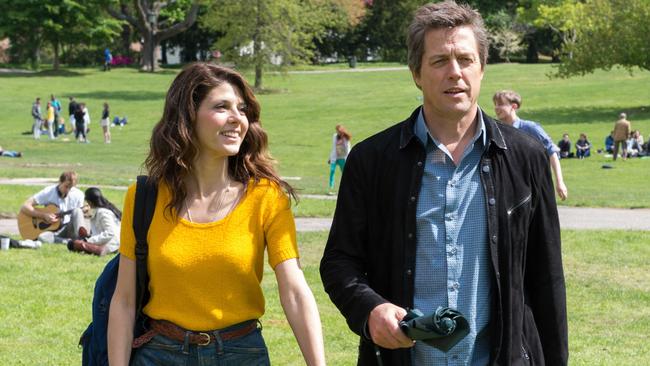The Rewrite, Sunday: Hugh Grant in good form
Hugh Grant is such a naturally funny actor that it’s possible to under-appreciate his comic gifts.

Hugh Grant is such a naturally funny actor that it’s possible to under-appreciate his comic gifts. He’s never less than amusing in The Rewrite, a romantic comedy that finds humour in cleverness rather than crassness. There are no poo, wee, snot or vomit jokes, no one hides objects up their bottom, the one moment of inappropriate sex is seen as just that, inappropriate, it’s quiet rather than loud and the only dance scene features a mother with her young daughters. In short, it’s the sort of comedy that seems out of favour in Hollywood today.
This is Grant’s fourth outing with American director Marc Lawrence, following the legal rom-com Two Weeks Notice (2002), the pop rom-com Music and Lyrics (2007) and the witness protection rom-com Did You Hear About the Morgans? (2009). It’s a collaboration that has been one of diminishing box-office returns.
Perhaps it’s not surprising, then, that The Rewrite has had such a muted release, in Britain and the US, where it came and went months ago, and now in Australia. It is a bit baffling, however, as it’s a long, long way from the worst movie you will see this year and boasts a classy cast that includes Oscar winners Marisa Tomei and JK Simmons. Interestingly, it’s a film that seems aware of its own untimeliness, riffing as it does on the fickleness of the movie business and the triumph of the screen over the written word.
It opens with Grant’s Keith Michaels pitching a film to two studio executives. He’s an Academy Award winner for writing a much-loved movie called Paradise Misplaced, but that was a long time ago. (In a neat touch, the flashback to Keith’s Oscar moment uses Grant’s Golden Globes acceptance speech for Four Weddings and a Funeral 20 years ago.)
Keith’s idea is for a film about Jack Nicholson faking his own death so as to watch people’s reactions. The studio executives are more interested in a Kick-Ass sort of movie in which a spunky young woman kicks ass, most of it male. You only have to glance at the Hunger Games-Divergent juggernaut to suspect such conversations are ripped from reality.
Desperate for a job — “I’m being rejected for rewrites of Piranha 3D’’ — Keith, who is divorced and estranged from his teenage son, heads to the east coast to teach a screenwriting course at Binghamton University in New York state (which is director Lawrence’s alma mater).
His arrival on campus sets up the comic and romantic possibilities. In short order he sleeps with a student half his age (Australia’s Bella Heathcote), slacks off on the job, condescends to an adult student (Tomei) who wants to take his course and, in the funniest sequence, at a wine and cheese gathering, insults the tenured Jane Austen scholar (Allison Janney) who also heads the ethics committee. Keith has to decide whether to quit and head home or stay and redeem himself.
You don’t have to be a Rhodes scholar to work out what he will do and who he will end up with, but it’s all done with flair and wit. Simmons is drolly terrific as the ex-marine faculty head alternately driven mad and reduced to loving tears by his wife and four daughters, while Chris Elliott pinches a few scenes as the Shakespeare scholar aware of his irrelevance. In contrast, the female characters, particularly Janney’s bluestocking, are a bit thinly drawn.
There’s an early scene where Keith and his Oscar statuette are waved through airport security. He makes a stupid joke about a bomb. “Sorry,’’ he says, “I used to know what was funny.’’ Like much of this smart film, that could be a joke on Grant or on us.
“Be brave,’’ Charlie (Dustin Clare) whispers to Eve (Camille Keenan) early in Sunday as the two new lovers prepare to leap from a cliff into the glinting water below. Those two words underscore the on-screen drama and the project as a whole.
Sunday is a self-financed trans-Tasman film made by two couples, actors Clare and Keenan, who also have writing credits, and director-writer Michelle Joy Lloyd and cinematographer Ryan Alexander Lloyd. While it will have a limited cinema release it is part of a growing trend towards bypassing the box office in favour of digital distribution. You can find details of where and how to see it at sundaythefilm.com.
Charlie and Eve met in Melbourne and had a passionate romance, seen in flashbacks to idyllic beach scenes. However, he left to pursue his mysterious job (precisely what he does is gradually revealed) and she returned home to Christchurch, a city still recovering from the earthquake of 12 months previously.
Five months later, Charlie returns. Eve is pregnant — Sunday is the name she tells him she has chosen for the child. Charlie wants to reconcile and be a family but refuses to quit the job that regularly will take him away.
She is uncertain, even hostile: “I don’t feel I have to explain this stuff to you,’’ she snaps when he makes jokes in a baby supplies shop.
The young would-be couple spend the day together, walking throughout the ruined city, arguing, laughing, remembering, trying to figure out what to do next. It’s a sort of Kiwi Before Sunrise. It’s cheesy at times and milks its jokes a bit hard, but it is also heartfelt and in its quieter moments feels real.
The Rewrite (M) Three stars
Limited release
Sunday (MA15+) Two and a half stars
Limited release



